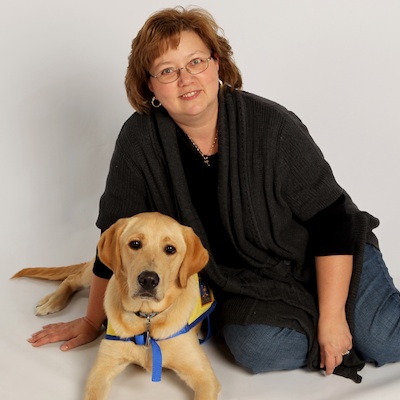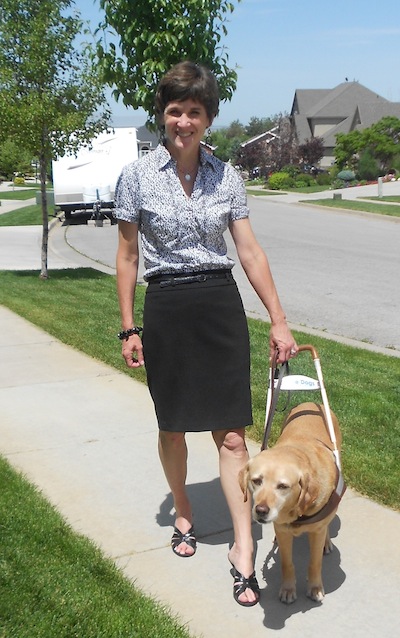And now, a word from a puppy raiser
July 18, 2012 • 34 Comments • Posted in Blogroll, guide dogs, UncategorizedWhen I published that post about the Ann Taylor store telling Becky Andrews she couldn’t come in with her guide dog, a lot of you commented and wondered how a business could be so ignorant. Donna Sword, a volunteer puppy raiser for Canine Companions for Independence, left a response that suggested sometimes it’s negative experiences with fake service dogs that make business owners more wary. I asked her to expand that thought into a guest blog, and she graciously said yes.
Masquerading as an assistance dog
by Donna Sword
The Americans with Disabilities Act protects the rights of a person with a disability to bring their service animal with them in public, and it defines a service animal as “any dog that is individually trained to do work or perform tasks for the benefit of an individual with a disability.” I do not have a disability, so I rely on the good faith of businesses to welcome my pup-in-training in their stores to support our socialization efforts.

Donna Sword with her current Canine Companions for Independence pup-in-training, Yaxley (Photo courtesy of Donna Sword).
On the rare occasions when we’re met with resistance by a business, we sometimes find it’s because of a past negative experience with a fake service dog. These folk that bring their beloved, but ill mannered, pets into stores perhaps don’t realize the barriers they’re creating for those who rely on guide dogs or assistance dogs for independence. And we’ve seen these pets on our own outings.
The dog under a restaurant table that first growled, then stood and barked aggressively, as the pup and I walked past. The small dog in the front seat of a grocery cart, standing to alert with a tense mouth when children approached too closely. A Chihuahua in a handbag at a concert, invisible except when barking. And the large dog at the mall that took two hands to control as he lunged to sniff passersby.
Each one of these dogs was wearing a vest that identified them as a type of assistance dog. But were they assistance dogs — or instead pets masquerading as such? To a business owner, there’s not a big difference. Whether it’s due to inadequate training or a personality not suited for service dog work, it’s the same. These dogs are seen as potential liabilities. Will these dogs cause customer complaints, a loss of business? Will they have a toileting accident in the restaurant? And rather worrisome, will these particular dogs inflict damage, personal or otherwise?
I find it interesting, and more than a bit distressing, that an assistance dog cape can be purchased online, complete with certification documents. A Google search will net you several companies that require only a credit card and a dog; no proof of training required. And rather ironically, the ADA does not require working dogs to display any identification nor is an individual required to have their dog certified as an assistance animal. This opens the door to abuse of the law, it seems. Unless challenged, anyone may claim their pet as an assistance dog.
This is wrong.
And so of course, businesses are cautious. And maybe just a bit confused. While the ADA laws are clearly written on the access rights of individuals, some businesses just aren’t educating themselves or their employees. They don’t know that an ill-behaved dog (whether it is a service dog or not)) can be asked to leave their place of business. Or that there are some questions they can legally ask, such as “is the service dog required because of a disability?” or even “what task has the dog been trained to perform?” One question businesses can not ask an individual is “what is your disability?”
A highly trained assistance dog or guide dog is not a pet. They are constant companions and loved by their handlers, that’s for sure, but these dogs are also necessary, a sort of “assistive technology” allowing a higher level of independence.
I’m afraid we’ve allowed the bad behavior of a few to build these barriers for those who rely on these dogs. I agree that many businesses have a need for more education on ADA, but there is also a need to crack down on these fake service dogs. And on the companies out there selling service dog capes and certifications making it too easy to allow public access to pets.



